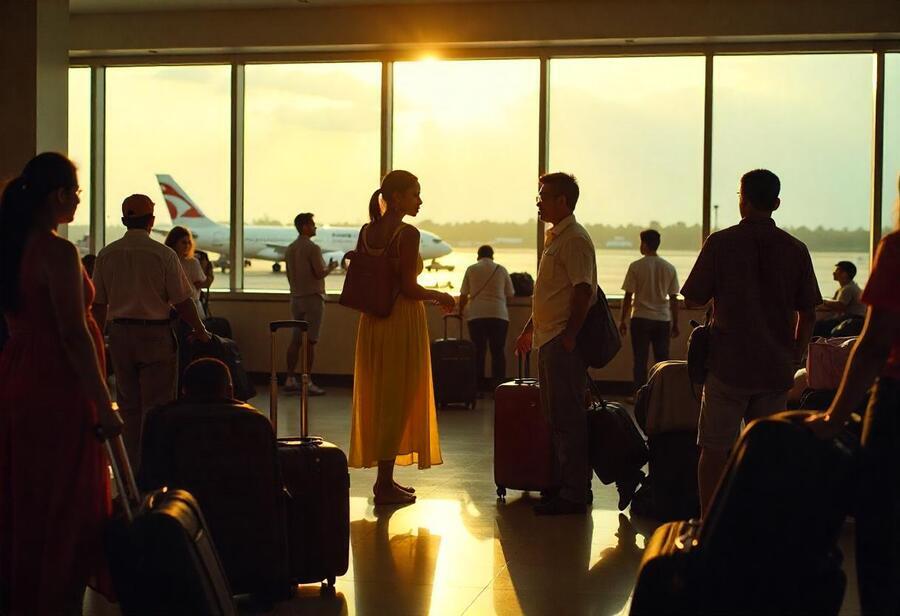Indonesia Volcanic Eruption Disrupts Bali Flights and Raises Travel Concerns - Focus on Travel News
Indonesia volcanic eruption impacts have once again disrupted travel plans, with flights to and from Bali facing significant cancellations and delays after Mount Lewotobi Laki Laki erupted twice on Monday. The eruption sent columns of grey ash soaring up to 18 kilometres into the sky and forced authorities to maintain the highest alert level for the volcano on Flores island.
The explosions blanketed nearby villages with ash while producing an avalanche of searing gas clouds, rocks, and lava that travelled up to 5 kilometres down the slopes. This activity was the most powerful since November 2024, when a major eruption killed nine people and injured dozens, prompting authorities to reevaluate danger zones that must be cleared of villagers and tourist activities.
The latest eruption led to immediate flight cancellations and delays across the region. By Monday afternoon, at least 24 international flights between Bali and destinations in Australia, Singapore, and South Korea had been cancelled, while others faced long delays. Airlines affected included Jetstar, Qantas, Indonesia AirAsia, and Virgin Australia, all issuing advisories prioritising passenger safety.
Although Bali’s Ngurah Rai International Airport itself remained open and operational, monitoring showed the ash cloud had not yet directly impacted Bali’s airspace. Nonetheless, caution forced airlines to adjust schedules, leaving many travellers stranded or rerouting plans with little notice. Passengers were advised to check airline websites and apps regularly for updates on flight status.
Two airports in East Nusa Tenggara Province—the cities of Maumere and Larantuka—remained closed on Tuesday due to hazardous conditions, according to Indonesia’s National Disaster Mitigation Agency. This closure cut off essential regional connections and heightened logistical challenges for local communities and tourists.
Travellers whose flights are cancelled by airlines can typically expect refunds or alternative arrangements. Most airlines will rebook passengers on the next available flight at no extra cost and may also cover accommodation, meals, and communication expenses while travellers wait. However, if a traveller chooses to cancel voluntarily without an official “no-go” warning from their government, they are unlikely to receive a refund or compensation.
Many travel insurance policies include natural disaster or trip disruption coverage. Still, travellers are urged to read policies carefully to ensure protection in the event of volcanic eruptions or other natural hazards. Without the right coverage, costs can mount quickly if itineraries are upended by unexpected natural events.
The UK’s Foreign, Commonwealth and Development Office (FCDO) has not issued new specific warnings for Bali itself due to the eruption, though it maintains advice against travel within designated danger zones around Mount Lewotobi Laki Laki and several other active volcanoes in Indonesia. These zones typically extend several kilometres from craters and are adjusted as volcanic activity changes.
For the latest official updates, travellers can consult Indonesia’s Center for Volcanology and Geological Hazard Mitigation (PVMBG) website, local airport authorities such as Bali’s Ngurah Rai International Airport, and the National Disaster Mitigation Agency (BNPB). These sources provide real-time alerts, eruption status, and travel safety information essential for planning around volcanic activity.
Volcanic ash clouds present a severe risk to aviation safety because they can damage engines and critical flight systems. When volcanic ash enters an aircraft engine, its glassy components melt due to extreme heat and then adhere to internal parts, obstructing airflow and damaging turbine blades. This can lead to catastrophic engine failure mid-flight.
Ash can also sandblast the exterior of a plane, eroding surfaces and damaging cockpit glass, reducing visibility for pilots. These dangers explain why airlines cancel or reroute flights when volcanic ash is detected, even when airports themselves remain technically open.
Indonesia is home to around 130 active volcanoes, making it one of the most volcanically active countries in the world. The archipelago sits on the Pacific Ring of Fire and the Alpide Belt—two of Earth’s most seismically active regions. These zones generate frequent eruptions and earthquakes, with local communities often living under constant threat of sudden natural disasters.
Mount Lewotobi Laki Laki itself has erupted multiple times this year alone, including in March, May, and now again in June. The country’s volcanology agency reports more than 400 recorded eruptions from the volcano this year, underscoring the need for ongoing monitoring and public readiness. While residents have adapted to living with these risks, large-scale eruptions still require coordinated evacuations and disrupt travel and daily life.
While Bali remains a popular destination for international tourists, travellers are urged to stay informed about volcanic activity when planning trips. Airlines will typically prioritise safety over schedules, and even small ash clouds can lead to significant delays or cancellations. Monitoring the latest government advisories and maintaining flexible travel plans can help minimise disruption and reduce stress when travelling to volcanic regions.
Travel experts also recommend comprehensive insurance policies that include natural disaster coverage. Travellers should confirm coverage details before departure, ensuring they are prepared for last-minute changes, additional costs, or even emergency evacuations if an eruption intensifies unexpectedly. With careful planning and awareness, it is still possible to visit Indonesia’s stunning landscapes while respecting the power of its natural environment.
You may also like...
Diddy's Legal Troubles & Racketeering Trial

Music mogul Sean 'Diddy' Combs was acquitted of sex trafficking and racketeering charges but convicted on transportation...
Thomas Partey Faces Rape & Sexual Assault Charges

Former Arsenal midfielder Thomas Partey has been formally charged with multiple counts of rape and sexual assault by UK ...
Nigeria Universities Changes Admission Policies

JAMB has clarified its admission policies, rectifying a student's status, reiterating the necessity of its Central Admis...
Ghana's Economic Reforms & Gold Sector Initiatives

Ghana is undertaking a comprehensive economic overhaul with President John Dramani Mahama's 24-Hour Economy and Accelera...
WAFCON 2024 African Women's Football Tournament

The 2024 Women's Africa Cup of Nations opened with thrilling matches, seeing Nigeria's Super Falcons secure a dominant 3...
Emergence & Dynamics of Nigeria's ADC Coalition

A new opposition coalition, led by the African Democratic Congress (ADC), is emerging to challenge President Bola Ahmed ...
Demise of Olubadan of Ibadanland
Oba Owolabi Olakulehin, the 43rd Olubadan of Ibadanland, has died at 90, concluding a life of distinguished service in t...
Death of Nigerian Goalkeeping Legend Peter Rufai

Nigerian football mourns the death of legendary Super Eagles goalkeeper Peter Rufai, who passed away at 61. Known as 'Do...




